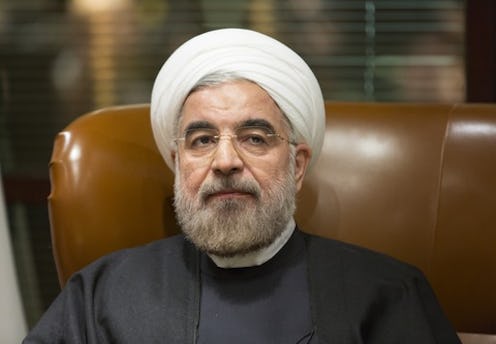News
It's a Big Day For Diplomacy

Today's a big day for diplomatic relations. As Iran prepares to meet with the Western countries it's been trying to woo over the past few weeks, the U.S. and Russia have reportedly come to an agreement on a plan to strip Syria of its chemical weapons.
Samantha Power, U.S. ambassador to the United Nations, announced today that the U.S. and Russia have agreed on a resolution, to be presented at the UN Security Council, to rid Syria of its chemical weapons supply. While such resolutions are technically non-binding, Syria is essentially at the mercy of Russia, by far its most powerful international ally. Russia has regularly blocked UNSC resolutions against Syria since the country fell into civil war two years ago, so the fact that it's managed to strike an agreement with the West is a big deal.
Meanwhile, the five permanent members of the UNSC (the United States, Great Britain, France, China and Russia, plus Germany) will meet today with representatives from Iran. It will be the most high-level meeting between representatives from Iran and the U.S. in six years, as Secretary of State John Kerry and Iranian Foreign Minister Javad Zarif meet face-to-face.
Kerry has reportedly been sent to test the waters following new President Hassan Rouhani's more moderate rhetoric and seeming willingness to discuss its nuclear program. In preparation for the big event, Iran's president has been busy offering up what would seem to be conciliatory measures: providing a more welcoming tone to Jewish people, releasing scores of political prisoners, and most importantly, promising to address nuclear weapons.
"Under no circumstances would we seek any weapons of mass destruction, including nuclear weapons, nor will we ever," Rouhani promised last week.
Iran is hoping that an improved relationship with the West will put an end to crippling economic sanctions currently placed on the country. Zarif is pushing for a phased compromise , in which Iran would gradually decrease nuclear activities in exchange for a gradual removal of economic sanctions.
But Western leaders including President Obama are concerned first and foremost with Iran's nuclear program, and say that without a frank discussion about weapons, there's not much to talk about.
"We believe the nuclear issue will be solved by negotiation," Rouhani has said in response, adding "we have nothing to hide."
A potential interaction between President Obama and President Hassan Rouhani was squashed after Obama more-than hinted at his remaining skepticism over Iran's intentions for its nuclear program, and Iran's leaders became concerned how a meeting between the two leaders would be perceived back home.
"The Iranians got back to us. It was clear that it was too complicated for them to do that at this time given their own dynamic back home," a senior U.S. official told Reuters.
Even a handshake would have been the first presidential interaction between the two nations in 30 years. Kerry promised reporters Thursday that he would update them on the talks "after they have been serious” and joked that this week's UN meetings are often the equivalent of “speed-dating diplomacy.”